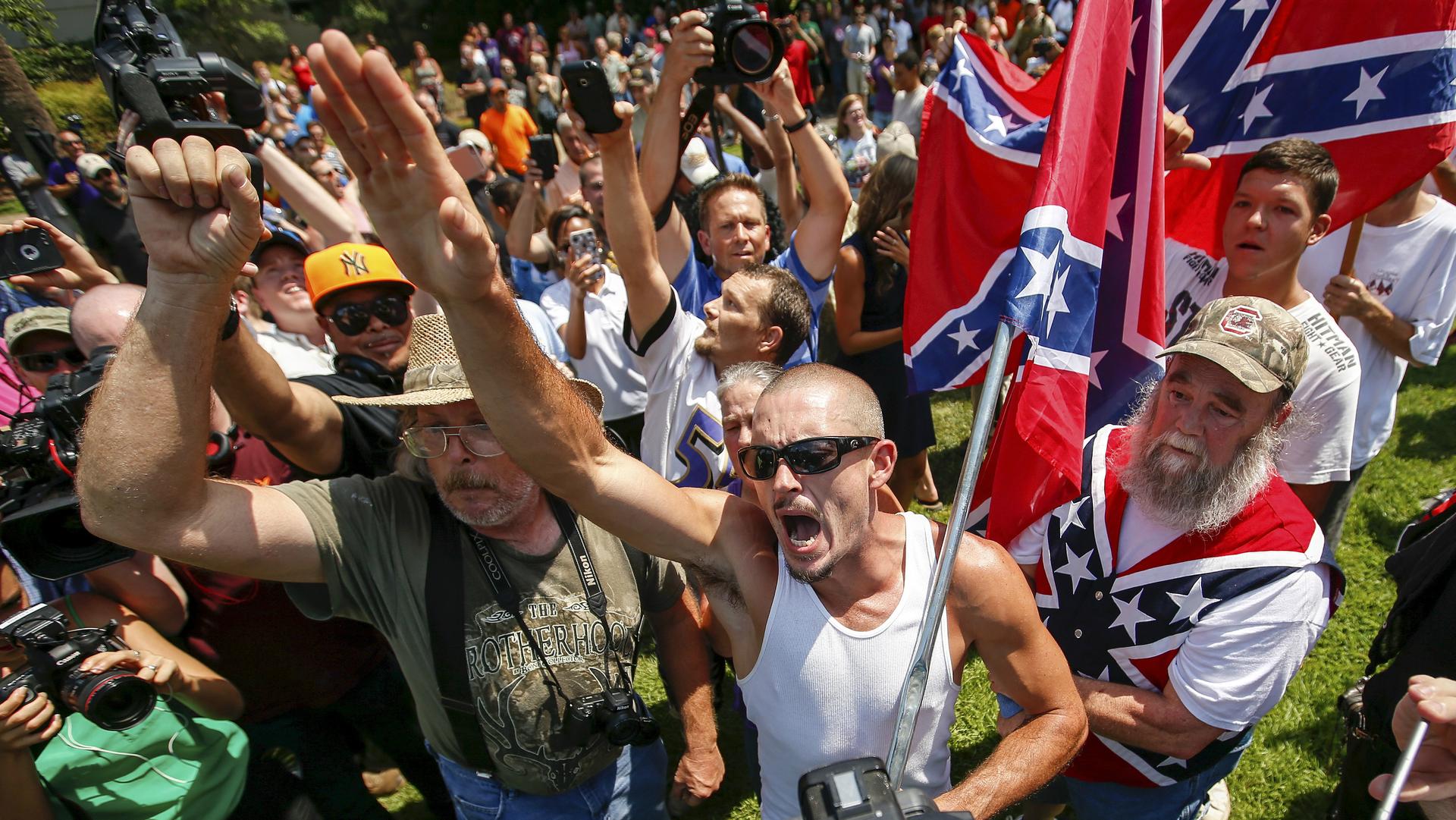President Trump, how do you plan to combat right-wing extremism in the United States?
Demonstrators rally at the statehouse in Columbia, South Carolina, July 18, 2015, after state officials decided to remove the Confederate battle flag from the grounds.
Over President Donald Trump's first 100 days, we're asking him questions that our audience wants answers to. Join the project by tweeting this question to @realDonaldTrump with the hashtag #100Days100Qs.
#91. @realDonaldTrump, how do you plan to combat right-wing extremism in the United States? #100Days100Qs
President Donald Trump was quick to speak out after a gunman in Paris killed a police officer and wounded others Thursday night. ISIS claimed responsibility for the attack.
The president was less outspoken about an attack closer to home last month.
On St. Patrick's Day, James Harris Jackson, a white 28-year-old US army veteran, took a bus from Washington, DC, to New York City with the intention of murdering black men. He'd hated black men since he was a child, he later told police, and he was especially angry about black men dating white women. Three days after arriving in the city, on March 20, he walked up to Timothy Caughman, 66, and stabbed him to death with a sword. He turned himself in to police on March 23.
It was front-page news in Trump's hometown papers, but he didn't tweet about the attack.
When Trump's press secretary, Sean Spicer, was asked about the killing on March 27, he said he didn't know all the details. Spicer then pivoted to defending the president's past silence about a wave of bomb threats against Jewish community centers. The media had blamed "people on the right," Spicer said, when many of the threats were actually called in by an American-Israeli dual citizen. "And it turns out, it wasn't someone on the right," Spicer said. "In that particular case, we saw that the president was right. And a lot of the folks on the left were wrong."
Given a chance to speak out against an admitted racist killing, the Trump administration chose instead to argue that the president had acted correctly in not condemning other threatened acts of right-wing violence.
As it turns out, the killing that Trump and his administration were remaining so quiet about was an act of terrorism — officially. Hours after Spicer's comments, Jackson was indicted for murder as an act of terrorism.
"Caughman was killed in furtherance of an act of terrorism," the indictment read, "intended to intimidate and coerce a civilian population, influence the policy of a unit of government by intimidation and coercion, and affect the conduct of a unit of government by murder, assassination, and kidnapping."
It was a terrorist attack on American soil, and the president was silent.
The day before Jackson turned himself in, a lone attacker in London drove a car into pedestrians on Westminster Bridge and then stabbed a police officer. An American tourist was among six people killed, including the attacker. The next day — the same day Jackson surrendered himself for the terrorist murder of Caughman — Trump tweeted this:
Cochran was killed by a terrorist. So was Caughman.
Trump's critics say this is a pattern. The president has been quick to condemn what he calls "radical Islamic terrorism." (His administration has even been accused of making up jihadi attacks.) But he's spoken much less often about the threat to Americans posed by homegrown right-wing extremists, white supremacists and radical anti-government groups.
Law enforcement agencies from the federal to the local levels consider these groups a significant terrorist threat — one that's grown in recent years thanks in part to racist and anti-government reactions to Barack Obama's presidency.
The president has some ideas about how to keep Americans safe from "radical Islamic terrorism." He promises to secure the borders. He's signed executive orders suspending the US refugee resettlement program and banning travel from several Muslim majority nations. And, presumably, his promised destruction of ISIS and the ideology that animates the group will have a trickle-down effect on homegrown jihadism in the US.
So that's his plan for "radical Islamic terrorism." Is it a good plan? Up for debate. But it's a plan.
But what about right-wing extremists? Trump doesn't seem to have a plan to keep Americans safe from those acts of terrorism. Or has he?
So, Mr. President, how do you plan to combat right-wing extremism in the United States? Click here to tweet the question.
Every day, reporters and producers at The World are hard at work bringing you human-centered news from across the globe. But we can’t do it without you. We need your support to ensure we can continue this work for another year.
Make a gift today, and you’ll help us unlock a matching gift of $67,000!
